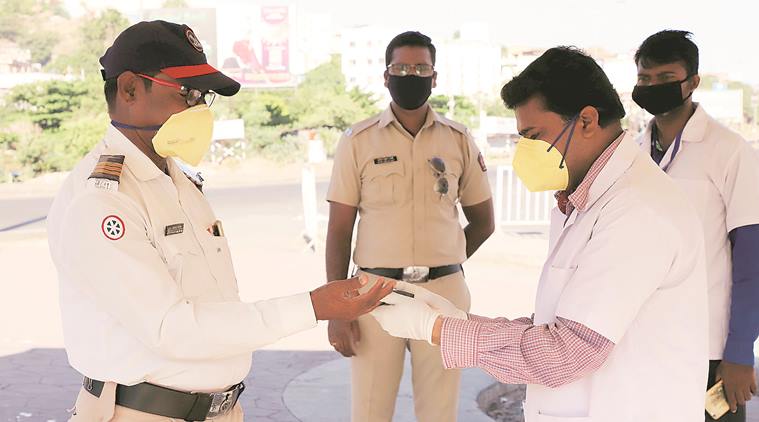
The Indian Express
Neither trained, nor equipped for Covid, Maharashtra police learns, adapts
ince the beginning of the outbreak and subsequent lockdown, the police have been deployed in contact tracing, monitoring of home or institutional quarantine and implementation of the lockdown, including curfews, closure of containment zones, district boundaries and issuing travel permits, deployment at hospitals and quarantines facilities, to name a few.
by Sushant KulkarniIN spite of having suffered casualties with 18 personnel losing their lives and over 1,750 testing positive till Sunday, the Maharashtra police continues to battle the Covid pandemic from the forefront.
Now, over two months into the crisis, there are many things that the force has learnt and adapted to while doing jobs for which they were neither trained nor equipped. Retired and serving police officers at the helm listed out things that need to be done to make sure the force is better prepared for present and any future challenge.
As on Sunday, 1,758 police personnel had tested positive, of whom 673 have already recovered. Eighteen, including one officer and 17 constables, have succumbed to the viral disease across Maharashtra. Since the beginning of the outbreak and subsequent lockdown, the police have been deployed in contact tracing, monitoring of home or institutional quarantine and implementation of the lockdown, including curfews, closure of containment zones, district boundaries and issuing travel permits, deployment at hospitals and quarantines facilities, to name a few. Lately, all police units have been given the added responsibility of facilitating homeward journeys of stranded workers, students and others. All this has been in addition to routine policing duties, although this has been lighter due to the lockdown.
Retired Director General of Police A N Roy said, “While other agencies including our health and civic agencies were not prepared for a crisis of this scale, the police force was the least ready among them all. It wasn’t in their mandate. They had no training, experience and above all were ill equipped to deal with the challenge of this scale. There was no template for this in the training module of the police. Even today we can see policemen on the ground doing their duties with meagre safety gear. In spite of all these odds, having suffered casualties, police have held their ground strongly.”
Roy, who retired as Maharashtra’s police chief, added, “While we don’t know when and what the next challenge will be, there will have to be some training template which would prepare the police machinery for unprecedented situations involving health or safety risks. They will have to be taught basic drills and will have to be physically and mentally ready for such challenges. Use of technology is proving and will further prove to be effective in reducing the need of direct contact. Each and every process, right from registering a crime till court proceedings conclude, we have to make changes to make sure that there is least possible contact. Further, the policymakers will have to learn from this crisis and ensure the safety of cops and their families in case of such emergencies.”
Pune Police Commissioner K Venkatesham said, “While there had been no rulebook or guide for a challenge like this, we will have to unlearn a lot of old practices and learn many things new. As first responders, we will have to make sure that there is least direct contact, at least for the time the threat remains. To that end we have closed our police chowkies and police stations have been made single point of contact. We are doing an experiment of online interaction between citizens and police officers. There is going to be more emphasis on digitisation of process of investigation and also custodial hearings. For example, DCP Suhas Bawache has ensured filing of over 120 chargesheets digitally. We are starting with completely digitising the process for the daily two hours in which citizens can directly talk to me. If successful, it will be replicated at police stations and other cells where public interaction is needed. Functioning of police stations will have to be changed, better access management will have to be put in place. Duties or tasks will have to be given to smaller teams to as to segregate the risk of infections.”
Some officers also stress on taking further community-centric policing practices. Mokshada Patil, Superintendent of Police of Aurangabad Rural jurisdiction, said, “Based on our experiences till now, I feel that policing in the future will have to be more participative of citizens than it is today. For example, the police force is enforcing social distancing norms today, but some onus has to be on people too. We will have to design community policing strategies accordingly so compliance comes voluntarily from people.”
She added, “There will have to be changes in the way planning is done for organising duties and deployment. More care is now mandated while handling arrested persons. We will have to adapt to the unfolding situations and learn at every stage.”
A police inspector who has served with many police stations in Pune said like police make sure that there are enough stocks of helmets, batons and barricades, they will also have to ensure there are enough stock of masks, sanitisers and face shields etc.
Venkatesham added, “Along with police welfare — which is all the more relevant in difficult times like these, we have also started taking care of their wellness. Physical, mental and even spiritual wellness. We have already been conducting workshops on emotional intelligence, which have now become an online module. We will have to put in place Standard Operating Procedures for everything including for when a cop goes home.”